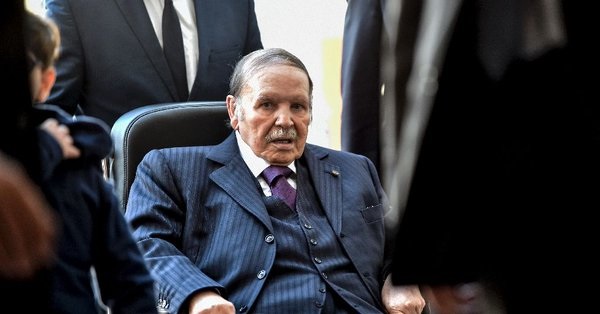
Algiers, Algeria | AFP | Algeria’s ailing President Abdelaziz Bouteflika resigned on Tuesday, nearly six weeks after the start of unprecedented protests sparked by his bid for a fifth term.
His resignation, announced by state television, came shortly after the army demanded the start of impeachment against him.
Here is a timeline:
– First protests –
On February 22, tens of thousands of people demonstrate in several cities in the first major protests against Bouteflika’s candidacy in April 18 elections.
After rallying calls on social media, thousands turn out to chant “No fifth mandate!” — including in Algiers, where demonstrations have been banned since 2001.
Police fire tear gas to block a march on the presidential palace, prompting demonstrators to respond by throwing stones.
– Warning –
On February 26, thousands of students rally peacefully in Algiers.
Two days later, a dozen journalists are detained for several hours as they participate in a rally against alleged censorship of protest coverage.
The prime minister Ahmed Ouyahia compares the growing protest movement to the demonstrations that erupted in Syria in 2011 and sparked a war now in its ninth year.
On March 1, tens of thousands protest across the country.
“Regime murderers,” some chant in Algiers. There are also marches in second and third cities Oran and Constantine.
– Final term pledge –
On March 2, Bouteflika, in Switzerland for nearly a week undergoing “routine medical checks”, sacks his veteran campaign manager.
The next day, a letter from the president is read on state television, in which he vows to not serve a full term if re-elected and to organise early polls in which he will not stand.
Shortly afterwards, his new campaign manager formally submits the president’s candidacy, just ahead of the deadline.
– ‘Chaos’ –
On March 5, as thousands march again, the army chief pledges to guarantee national security, accusing unidentified groups of wanting a return to the “painful years” of Algeria’s 1992-2002 civil war.
Bouteflika on March 7 warns of “chaos” if troublemakers infiltrate the demonstrations.
On March 8, tens of thousands in several cities take part in the biggest rallies yet against Bouteflika’s candidacy.
– Bouteflika quits race –
On March 10, Bouteflika returns from Switzerland. The next day, he pulls out of the race.
“There will not be a fifth term” and “there will be no presidential election on April 18,” he announces on official media.
Interior minister Noureddine Bedoui is named prime minister, replacing unpopular premier Ouyahia.
On March 15, a huge crowd marches through Algiers for a fourth consecutive Friday, demanding Bouteflika’s ouster. Major protests are held in other key cities.
– Holding on –
On March 18, Bouteflika issues a statement confirming he will stay on as president beyond the end of his term on April 28 and until new elections are held, following a constitutional review.
– ‘Unfit’ –
On March 22, exactly a month after the protests started, hundreds of thousands of Algerians again stage demonstrations across the country.
On March 26 army chief Ahmed Gaid Salah calls for Bouteflika to step down or be declared medically unfit to rule under the constitution.
A day later the ruling party’s long-time coalition ally, the National Rally for Democracy (RND) of former prime minister Ouyahia, says it “recommends the resignation of the president”.
The head of the powerful General Union of Algerian Workers (UGTA), Abdelmadjid Sidi Said, welcomes the army chief’s call.
On March 28, the president of Algeria’s Business Leaders Forum, Ali Haddad, close to Bouteflika, resigns.
The next day, hundreds of thousands of anti-government protesters throng the streets of Algiers and other cities. Demonstrators are unswayed by the moves by top loyalists to abandon Bouteflika.
On March 31 Bouteflika names a new government headed by Bedoui. Salah, the armed forces chief who has called for the president to step down, remains as deputy defence minister.
On April 1 a statement on state media says Bouteflika will resign before his mandate expires on April 28.
– Resignation –
On April 2 Salah demands the immediate launch of impeachment proceedings against Bouteflika. The army describes the announcement he will resign by the end of his mandate as invalid because it did not come from the president himself.
Shortly afterwards state television reports that he has informed the Constitutional Council that he is resigning effective Tuesday.
 The Independent Uganda: You get the Truth we Pay the Price
The Independent Uganda: You get the Truth we Pay the Price



